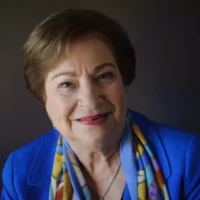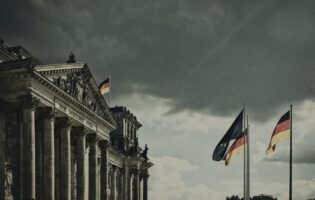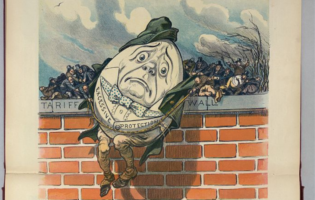Ostpolitik Reset: How Germany is Re-Evaluating its Relationship with Russia

Angela Stent
Georgetown University
Dr. Angela Stent is director of the Center for Eurasian, Russian and East European Studies and professor of government and foreign service at Georgetown University. She is also a senior fellow (nonresident) at the Brookings Institution and cochairs its Hewett Forum on Post-Soviet Affairs. Dr. Stent’s experience also includes serving as national intelligence officer for Russia and Eurasia at the National Intelligence Council and serving on the Policy Planning Staff at the US Department of State. Dr. Stent’s academic work focuses on the triangular political and economic relationship between the United States, Russia, and Europe. Her latest book is The Limits of Partnership: US-Russian Relations in the Twenty-First Century (Princeton University Press, 2014).
The Chancellery recently announced that Angela Merkel will not attend the May 9 Moscow celebration to mark the seventieth anniversary of the end of World War II. She will, however, lay a wreath at the tomb of the Unknown Soldier in Moscow with President Vladimir Putin the following day. This dual message symbolizes where German-Russian relations are today: reluctance to give official endorsement to Putin’s military parade while armed conflict continues in Ukraine but recognition that, because of Berlin’s special historical responsibilities, Germany must continue to show respect to Russian citizens for the sacrifices they endured during the war. German-Russian relations have seriously frayed since Russia’s annexation of Crimea and they face a period of great uncertainty going forward. Merkel’s Ostpolitik—which seemed so successful for the past decade—has had to confront the new reality of an intransigent Russia that has challenged the fundamental premises of that policy. Berlin today must grapple with a new paradox: while the expectations of partnership of the past two decades have been jettisoned in face of Russia’s continuing support for the war in Ukraine, Germany has emerged as the only country that can broker an end to the most serious crisis in East-West relations since before Gorbachev came to power.
Ever since the Soviet collapse, German Ostpolitik—whether under Helmut Kohl, Gerhard Schröder, or Angela Merkel—has been premised on a series of fundamental principles. Engagement with Russia was essential, however challenging the process was. Russia was viewed as a large, important, difficult neighbor with whom Germany—and indeed all of Europe—was fated to engage. Moreover, Germany’s gratitude toward Russia for facilitating the peaceful unification of the country meant that Berlin had a unique role and responsibility in Europe in assisting Moscow in its difficult post-communist transition. Under the first CDU-SPD grand collation government, Foreign Minister Frank-Walter Steinmeier championed the concept of “Rapprochement through Integration” (Annäherung durch Verflechtung). As Dimitri Medvedev entered the Kremlin, Steinmeier announced a “Partnership for Modernization” with Russia, and he underscored the importance of the relationship by saying “Russia is and will remain an indispensable strategic partner if we want to create an all-European peace order.”[1] Undergirding this project was the assumption that Moscow wanted to be integrated into Europe and indeed that integration was the only option. Hence trade and energy interdependence with Russia were not only beneficial for the German economy but would contribute to Russia’s transition and promote closer and more productive political relations and overall stability.
When Gerhard Schröder, after his electoral defeat in 2005, assumed the role of Chairman of the International Advisory Board of the German-Russian Nordstream gas pipeline project and subsequently described Vladimir Putin as a “flawless democrat” (Lupenreiner Demokrat), he was criticized by some. But many Germans viewed the special German-Russian partnership favorably as economically and politically beneficial, especially against the backdrop of criticism of the U.S. invasion of Iraq and other Bush administration policies.
Chancellor Merkel’s attitude toward Russia was, of course, greatly influenced by having grown up in the GDR. Nevertheless, despite whatever concerns she may initially have had about dealing with the Kremlin, she understood the importance of engaging Putin and was also attuned to the views of German industry, for whom Russia is an important market and source of employment. Moreover, Russia is an important energy partner, providing 36 percent of Germany’s natural gas supplies. Given the greater skepticism toward Russia of the new European Union members, Merkel also faced the challenge of crafting a more unified EU Ostpolitik and worked closely with Poland and other Central European states to create a joint stance on a range of issues.
Even before the Ukrainian crisis began, Berlin had begun to realize that it was becoming more difficult to deal with Russia after Vladimir Putin returned to the Kremlin in 2012. Like other Western Leaders, Merkel was initially hopeful that when Dimitri Medvedev became president in 2008, Russia would indeed embark on the modernization program that he initially championed. She also expended considerable effort in trying to resolve the frozen conflict in Transnistria. Nevertheless, Putin announced in September 2011 that he was returning to the Kremlin and faced mass protests three months later, which he blamed on the West. Berlin realized that the prospect of Russia embarking on the modernization reforms that Germany supported was becoming increasingly remote. Once Putin was re-elected, the domestic clampdown on opposition groups intensified and German-Russian relations became more testy.
Germany’s Russia policy has for some time been a subject of domestic debate and dispute. The Greens have consistently been among the most critical of Putin’s domestic crackdown and have demanded a tougher line toward Moscow. Both Die Linke and Alternative für Deutschland have largely been uncritical supporters of Moscow. The SPD is divided between those who are more or less favorably inclined toward Moscow, and the CDU-CSU is also split between those whose outlook toward Moscow is shaped by commercial concerns and those who look at Russia through a lens determined more by security and human rights concerns. The previous CDU-CSU official responsible for policy toward Moscow, the late Andreas Schockenhoff, became highly critical of Russia and its domestic and foreign policies, while his SPD successor Gernot Erler was initially less critical, urging continued engagement.
German attitudes toward Russia are also a function of German views of the United States. In a curious throwback to Cold War days, those more critical of the United States are often better disposed toward Russia and vice versa. In this sense, the Snowden affair—coming a year before the onset of the Ukraine crisis—has also affected Germany’s relations with Russia. The NSA leaker’s revelations about U.S. surveillance activities in Germany—including apparently the chancellor’s cell phone—and the fact that Putin granted him political asylum have reinforced the views of those already favorably disposed toward the Kremlin and hostile to the United States.
The Impact of the Ukraine Crisis on German Ostpolitik
Germany played a leading role in the EU’s policy toward Ukraine prior to the November 2013 Euro-Maidan movement. Some have criticized the EU negotiators for focusing too much on technical issues in its talks with Kyiv and ignoring the broader geopolitical implications of the Eastern Partnership program—namely that Russia began to view it as a threat. Berlin supported the negotiations for an Association Agreement with President Viktor Yanukovych but also was insistent that he free his opponent Yulia Tymoshenko from prison as part of the deal. After he rejected the deal at the eleventh hour and the protests grew and eventually turned violent when 100 demonstrators were killed on 20 February 2014, Steinmeier, French Foreign Minister Laurent Fabius, and Polish Foreign Minister Radek Sikorski went to Kyiv to negotiate an agreement with Yanukovych whereby he agreed to early presidential elections in December 2014. The German officials left Kyiv believing that the situation had been defused, only to discover to their astonishment the next day that Yanukovych had fled Kyiv during the night. His security detail had begun to abandon him and he apparently feared that, if he stayed, he might meet the same fate as the Romanian dictator Nicolae Ceausescu, executed by a firing squad in December 1989.
The Kremlin has repeatedly accused the United States and its allies of supporting a “fascist coup” in Kyiv after Yanukovych fled. Shortly thereafter, Russia annexed Crimea, in violation of the 1994 Budapest Memorandum whereby Ukraine gave up its nuclear arsenal in return for guarantees of territorial integrity from the United States, Russia, and the United Kingdom. Then came the launch of a hybrid war in eastern Ukraine where Russian troops and military hardware supported groups of Separatists led by an assortment of warlords. Within the space of six weeks, the post-Cold War peaceful European order in which Chancellor Merkel had invested so much effort to nurture and sustain was shattered.
Initially, the German response was cautious. Given the considerable German economic stake in relations with Russia, Berlin was reluctant to impose robust sanctions on Russian individuals and companies. The downing of Malaysian Airlines flight MH 17 changed all that. The catastrophic loss of Dutch lives—proportionately worse than the U.S. losses on 9/11—and the callous way in which the Separatists hindered access to the crash site had a profound effect on European public opinion. Chancellor Merkel took the lead in securing EU backing for far-reaching financial sanctions that have made it difficult for Russia to access global capital markets and, along with the halving of oil prices, have imposed considerable economic pain on Russia—although they have not, so far, led to a moderation in Russian policies.
Even as German-Russian relations have deteriorated, however, Merkel has taken the lead in dealing with President Putin and seeking to de-escalate the conflict in eastern Ukraine. Indeed, the White House has delegated the diplomacy of the Ukraine crisis to Germany and has taken a back seat in the negotiations. Merkel is the Western leader who has the most intense contact with Putin, speaking to him frequently by phone. She has also been the lead negotiator in the two Minsk ceasefire agreements. Her frequent conversations with Putin led her apparently to remark to President Barack Obama that the Russian president has a different understanding of reality than do his Western counterparts. German officials say that Merkel’s experiences of having Putin frequently say one thing and do another have hardened her view of the Russian leader. In a speech in Australia, after hours of frustrating talks with Putin, she used forceful language about Russia that would have been unthinkable two years ago and showed how far German Ostpolitik had evolved:
Nevertheless, we’ve seen that even in Europe there are still forces which refuse to accept the concept of mutual respect or the settlement of conflicts using democratic and rule-of-law means, which believe in the supposed law of the strong and disregard the strength of the law. That’s exactly what happened when Russia flouted international law and annexed Crimea at the start of the year. Russia is violating the territorial integrity and the sovereignty of Ukraine. It regards one of its neighbors, Ukraine, as part of a sphere of influence. After the horrors of two world wars and the end of the Cold War, this calls the entire European peaceful order into question. Russia is now seeking to exert influence in order to destabilize eastern Ukraine in Donetsk and Luhansk.[2]
Nevertheless, Merkel remains committed to pursuing a peaceful resolution of the conflict in a variety of formats. The negotiations that produced the Minsk Two ceasefire agreement involved Merkel, French President Francois Hollande, Putin and Ukrainian President Petro Poroshenko, with Belarusian president Alexander Lukashenko as the host, and a separate track for the Separatists. It is notable that neither the U.K. nor Poland, for instance, has been party to these talks. So far, the February Minsk ceasefire has been more or less holding, but it remains fragile. Merkel has repeatedly reiterated that there is no military solution to the crisis, a point that she emphasized at the February Munich Security Conference, much to the dismay of Senator John McCain and those of his Senate colleagues who favor sending lethal defensive weapons to Ukraine. Although Merkel has made it clear that she regards sending weapons to Ukraine as dangerous, it is also evident that she has been able to use the threat of U.S. weapons supplies as a way of maintaining EU unity over sanctions, warning that lifting EU sanctions might lead the White House to reverse its current opposition to arming Ukraine.
Can Ostpolitik be Reset?
Berlin will remain committed to making sure the Minsk agreement is implemented. Nevertheless, senior German officials admit that their expectations of achieving a successful outcome are very modest. They understand that, at best, the situation in the Donbass region will remain a frozen conflict that will not be resolved for the foreseeable future. They also recognize that it is highly unlikely that Moscow will acquiesce to Kyiv regaining control over its border in eastern Ukraine. Steinmeier has warned that, if there is a move by the Separatists and their Russians backers to take the port city of Mariupol, it would be the end of Minsk. The Minsk agreement is flawed, but it was apparently the best that could be achieved in February.
Merkel’s other challenge will be to maintain EU unity on sanctions. There is pressure from Greece, Cyprus, Hungary, Italy, and Spain to end sanctions, even though Russian policies have not changed. Although the last EU meeting on this subject produced agreement to keep the sanctions until the end of 2015, there will be a another discussion about whether to maintain them after July, when the post-MH17 financial sanctions come up for renewal. The German business community has so far supported Merkel but, if other countries break their sanctions solidarity, the private sector will be eager to resume business ties with Russia—although that may prove to be challenging after a year of sanctions.
The other plank in German policy is to support Ukraine’s efforts to reform its economy, legal system, and governance. Merkel has maintained close contacts with Ukrainian president Petro Poroshenko, and Berlin is actively engaged with Ukraine in its daunting challenge of dealing with corruption and modernizing its political structures while avoiding financial collapse. The goal is to make Ukraine more resilient to pressures both from Russia and from oligarchic and other domestic elements that want to perpetuate the opaque structures that have led Ukrainians twice in the last decade to take to the streets in the Maidan and overthrow their government. But Berlin, like Washington, is also aware that it is sometimes difficult to help Ukraine.
German officials are also looking beyond the current crisis to a time when it may be possible to re-engage Russia. But how? Russia has upended the post-Cold War European order and shows little inclination to restore it. Indeed, Putin has explicitly rejected the Euro-Atlantic order that, he believes, was unfairly imposed by the West on Russia in the 1990s and has called for the creation of a new world order based on different—but as yet not articulated—legal and moral norms.[3] In 2008, Medvedev gave a speech in Berlin calling for a new Euro-Atlantic security architecture.[4] His speech was short on specifics, and a later draft of a proposed treaty would have essentially emasculated NATO. It was discussed in a desultory way in the OSCE during the Greek presidency and then faded away. Will Germany seek to revise the debate over a new European security architecture when it holds the OSCE chairmanship in 2016?
Barring a major escalation in the Ukraine crisis or Russian military actions beyond Ukraine, Germany will continue to engage Russia on a number of fronts. Berlin recognizes that Russia is no longer a strategic partner and that expectations for integrating Russia into EU structures were premature and must be put on hold. Nevertheless, Germany will remain Russia’s most important European interlocutor. Angela Merkel will continue to take the lead in dealing with Vladimir Putin, however challenging that is. She is confronted with a Russia that has undermined Europe’s stability and shows little inclination to resolve the Ukraine crisis. This is a threat to the peaceful European order that Germany has helped to craft since unification. Nevertheless, for reasons of history, geography, and economics—and a German public that remains deeply divided on how to deal with Moscow—Berlin is in this game for the long haul.
Angela Stent directs the Center for Eurasian, Russian, and East European Studies at Georgetown University and is the author of “The Limits of Partnership: US-Russian Relations in the Twenty-First Century,” just released in paperback with a new chapter on the Ukraine crisis.
[1] Speech by Foreign Minister Frank-Walter Steinmeier at the Willy Brandt Stiftung, 4 March 2008, http://www.auswaertiges-amt.de/DE/Infoservice/Presse/Reden/2008/080304-BM-Ostpolitik.html
[2] Speech by Chancellor Angela Merkel at the Lowy Lecture, 17 November 2014, http://www.lowyinstitute.org/publications/2014-Lowy-Lecture
[3] Speech by President Vladimir Putin to the 2014 Valdai Club, 24 October 2014, http://eng.kremlin.ru/news/23137
[4] Speech by President Dmitry Medvedev at a Meeting with German Political, Parliamentary, and Civic Leaders, 5 June 2008, http://archive.kremlin.ru/eng/speeches/2008/06/05/2203_type82912type82914type84779_202153.shtml









